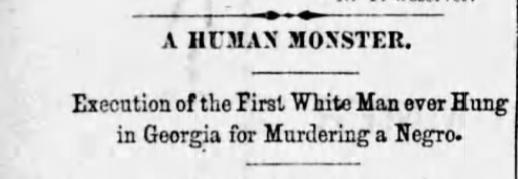
An estimated crowd of 20,000 people, the largest ever in the city of Rome, Georgia came to watch Gus Johnson hanged, hear him confess to various crimes and watch to see if he brother would bring an army to rescue him.
It was March 16, 1878. Johnson gave his last words:
This is Gus Johnson, who you have heard of as a bad man. Some think I am a monster. My father was Colonel in the rebel army and bore a good name. I am to die for killing a negro 14 miles down the Coosa River. I am sorry I killed him…. I have always been a bad boy. I have killed four men in my life. I can swear to two. I have friends in the crowd who would rescue me but I want them to let me hang. Cicero Echols, John Beard, and Bob Millican killed Squire Foster, a colored man. They would have been hanged, but they bribed the solicitor with $25, and the case was nolle prossed.”
With that, Johnson fell seven feet, but took 17 minutes to strangle to death.
Johnson’s father, Jeff Johnson, commanded a regiment for the Confederate Army. After the war, he led the Ku Klux in the area, taking his two sons including 14 year old Gus along on the raids.
“He headed these moonlight troopers on many a wild ride and many a poor devil of a negro heard his harsh voice in command of the maskers that surrounded his little cabin.”
Johnson said he had killed four men, but to others bragged eight – it may have been more or less. One that was more or less confirmed was a horse thief with a reward on his head. In fact, there was a $25 reward for return of the horse, and $25 for the thief. Johnson brought a shot-up horse back to the rightful owner and asked for the full $50. The owner said he was entitled to only the $25 for the horse. Johnson replied, “that’s so, but I brought his hat and his ear; I couldn’t very well bring him.” He then reached in his vest pocket and produced “a freshly-cut, cleanly-washed human ear.” He then told the story of killing the horse thief with buckshot to his head.
Later, Johnson was tried for murder in Selma, Alabama. There, several black citizens had won election in the city and the whites were starting to riot. Johnson volunteered to “arrest” one of the black men the whites found offensive. Johnson was deputized to do so and then shot the man through the head. A jury let him off as an act of self defense.
Johnson had raped at least two women, one his cousin. In the last instance, his family got the court to declare him insane and committed to the state Lunatic Asylum. He quickly escaped, only to heard towards the Coosa River ferry where he’d commit his last crime.
It was August 24, 1876 and Johnson was in good spirits, consuming good spirts. He harassed several black pedestrians into leading him to ferry on the Coosa River. The ferryman was Daniel Alford. Johnson ordered Alford to “hurry up.” Alford said “if you want the boat any quicker than I’m going to bring it over, you had better come and fetch it yourself”
Johnson grabbed his gun. Alford said “don’t fool with me with that gun.” Alford turned the boat loose and his companion told Alford to look out. Johnson leveled his gun at Alford and fired. Alford fell over the ropes of the boat mortally wounded. Johnson mounted his horse and rode off.
As he rode off, he told an acquaintance he met he’d killed the man, and that the authorities were too afraid of him to arrest him.
Johnson was so well known, so feared and hated that this cowardly act got the attention of the governor. A proclamation was issued in newspapers throughout the state.
A day later, there was camp meeting and log rolling with many in attendance including the sheriff. Johnson came and his friends told him to leave or he’d surely be arrested. The Sheriff summoned the crowd as a posse and forced Johnson’s surrender.
Johnson was tried in Floyd County, Georgia where his attorneys had no argument except insanity. The judge and jury didn’t buy it. The jury verdict read “we, the Jury, find the defendant guilty of murder.” Further, the jury found that he was to die on “a gallows to be erected by the Ordinary of said county, within one mile of the Court House, in said county, with a rope about your neck, and that you, the said Augustus Johnson, by the Sheriff or his successors in office, with the rope aforesaid at the time aforesaid, be privately hanged by thence until you are dead, dead, DEAD. And may the Lord have mercy upon you.”
There was some consternation among the white citizens that killing a black man was a hanging offense. But Johnson was too odious to allow to live any more.
Sources
Cincinnati Enquirer, March 16, 1878, pp. 1-2
New York Times, March 16, 1878, p. 5.
Rome Weekly Courier, April 25, 1877, p. 3.
Rome Tri-Weekly Courier, August 26, 1876, p. 3.
Springfield Weekly Patriot, March 28, 1878, p. 4.
